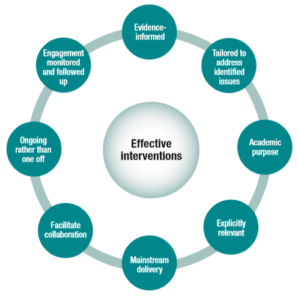Student engagement can have a positive impact on enhancing the student experience and has a critical role to play in improving student retention and achievement. Teesside University is committed to promoting effective engagement and key elements of its Learning and Teaching Strategy explicitly captures how we engage our students:
- Create a learning culture and an innovative curriculum with inspirational teaching informed by research and employer engagement and the professions.
- Create a stimulating learning environment that provides the space, facilities and technology for effective learning and personal development.
Trowler states that:
“Student engagement is concerned with the interaction between the time, effort and other relevant resources invested by both students and their institutions intended to optimize the student experience and enhance the learning outcomes and development of students and the performance, and reputation of the institution.” (2010, p.3).
Effective Practice to Engage Students
Reflecting on Trowler’s definition of student engagement, if our students are engaged this can improve retention, progression and achievement enhancing student success. It adds value to the learning experience and promotes autonomous and self-directed learning; engaged students are more likely complete follow up work and reading around their discipline. Engaged students will be more motivated with increased levels of participation, confidence and student satisfaction, this subsequently can lead to increases in staff satisfaction levels. The benefits derived from enhanced levels of student engagement are unquestionable and therefore it is important to consider what practices can be effective in engaging students.
In a comprehensive ‘What Works? Student Retention & Success Programme’ Thomas (2012) identified a set of principles that should inform interventions and approaches designed to engage students. The importance of approaches being embedded into mainstream provision is recognised and the need for activities to be proactive, relevant, timely and collaborative; it is also important to monitor student engagement. Further detail around these principles is provided below.
| Mainstream: interventions and approaches should as far as possible be embedded into mainstream provision to allow all students to benefit.
Proactive: activities need to proactively seek to engage students, mindful that more motivated students are likely to take up opportunities. If students have to opt in, make it transparent how students can and should engage, and the reasons for this. Relevant: activities need to be informative, useful and relevant making the benefits of engagement explicit to students. Timely: it is important to remember that early engagement is essential and not to have information overload. Think about the balance between one-off activities and those that benefit from taking place over time. Collaborative: activities should encourage collaboration with other students and staff. Monitored: students’ engagement should be monitored, recognising different forms of engagement and where low levels of engagement are evident then follow up action should be taken. |
A second phase of the What Works? Programme (Thomas et al 2017) involved working with Institutions putting into practice the learning from the earlier work, evaluating impact and expanding understanding in implementing change. Analysis around effective interventions and approaches further developed understanding in this area and resulted in a renewed list, depicted in the diagram below. In particular, it is recognised that interventions should be tailored to address specific discipline requirements and student cohort characteristics. The importance of ongoing interventions was noted and that one-off activities are not sufficient:
“improving engagement and belonging should extend throughout the first year student experience, either through ongoing interventions (e.g. active learning, personal tutoring, or peer mentoring) or through a programme of linked engagement activities (often starting pre-entry and including a focus on potential future employment outcomes).” (Thomas et al 2017, p. 12).

Source: Thomas, L. et al (2017, p. 13)
Learning and Teaching Practices to Promote Student Engagement
The seven principles for good practice in Undergraduate Education developed by Chickering and Gamson (1987) are well cited and despite dating back to 1987 are still of significant value to more contemporary literature around this area. The seven principles are outlined below.
- Encourage contact between students and faculty: frequent contact is important both in and out of more formal ‘teaching settings’; this helps to encourage motivation and involvement
- Develop reciprocity and cooperation among students: effective learning is collaborative and social, not competitive and isolated; a team effort as opposed to individual learning can enhance learning.
- Encourage active learning: talking about what students are learning helps understanding; relating it to past experiences and applying the learning.
- Give prompt feedback: providing feedback allows students to understand what they know and don’t know; it helps to focus learning and ongoing opportunities for feedback should be embedded throughout learning and teaching practices.
- Emphasize time on task: ‘Time plus energy equals learning’; making effective use of time is important to learning, students may need help in this area.
- Communicate high expectations: expect your student to do well, the more you expect the more you will get.
- Respect diverse talents and ways of learning: students learn differently and a variety of opportunities to allow learning to take place is important.
Evans et al (2015) in their comprehensive project exploring high-impact strategies to enhance student engagement and achievement analysed pedagogic approaches in 273 articles and found that the key elements of effective practice that emerged from their work aligned with Chickering and Gamson’s principles. Through thematic analysis of the 273 articles five themes emerged around effective practice.
- Real-world student engagement is promoted through the use of real-life examples.
- Student self-understanding is supported through experiential approaches including the use of guided critical reflection.
- Advance access to course materials is promoted to enable students to familiarise themselves with materials and to prepare for learning prior to taught sessions.
- Enhancing student access to learning is achieved by ensuring accessibility of ideas at the perceptual level and at higher levels of information processing through appropriate scaffolding and use of tools and models to support understanding.
- Effective assessment and feedback practice.
Evans et al posed the question: “For which of these pedagogies is there a robust evidence base evaluating the effectiveness of the pedagogy in generating student engagement?”
“a number of key themes were identified, including an emphasis on the use of visual representations; integrated approaches to curriculum development; co-operative learning activities; inquiry including simulations, problem-based and project-based learning; assessment initiatives to include students as producers, co-assessors, and self-assessors.” Evans et al (2015 p. 24).
Insights from the What Works? Student and Retention Programme Project
“High quality, student-centred learning and teaching is at the heart of improving the retention and success of all students. Academic programmes that have higher rates of retention and success make use of group-based learning and teaching, and varied learning opportunities including real-world learning and work placements. They provide guidance and support with assessment, useful feedback, a dedicated physical space, op-out co-curricular activities and staff-organised social events.” (Thomas, 2012, p. 31).
The projects that were explored in the What Works? Programme found that the following factors contribute to belonging:
- Staff/student relationships
- Curricular content and learning and teaching practices
- Assessment and feedback
- Personal tutoring
- Peer relations and cohort identity / friendships
- A sense of belonging to a particular place within the university e.g. department building/small campus
Focussing on curricular content and pedagogies, the following were identified as contributing to enhanced levels of engagement:
- Active learning, engaging students in problem/practice-based learning and drawing on real world examples
- Collaborative learning and small group teaching encouraging and facilitating the sharing of own experiences
- Enthusiastic and knowledgeable lecturers
- Offering a range of learning experiences
- Having work placements and field trips
With regards to assessment and feedback; clarity around assessment process and expectations and feedback on assessments were important. Feedback needs to be helpful to students particularly in how it can be used to inform future assessments
Please Share your Practices around Engaging Students
Reflecting on the findings summarised above and other literature around this area I would like to pull together some ‘top tips’ / ‘key considerations’ around learning and teaching practices that engage students. I would however like to include all the innovative and excellent that work is going on across Teesside particularly during our shift to online delivery. Please email me, n.poppitt@tees.ac.uk, with an overview (one liners would be great) around what you are doing in your practices to engage students and what are you finding is working particularly well. I look forward to hearing from you.
References
Chickering A.W., Gamson, Z, F. (1987) Seven principles for good practice in Undergraduate Education, AAHE Bulletin. https://eric.ed.gov/?id=ED282491 (Accessed 07/05/2020).
Evans, C., Muijs, D., and Tomlinson, M. (2015) Engaged student learning High-impact strategies to enhance student achievement. York: Higher Education Academy.
Thomas, L., Hill, M., O’ Mahony, J., and Yorke, M. (April 2017) Supporting student success: strategies for institutional change What Works? Student Retention & Success programme Summary Report. London: Paul Hamlyn Foundation.
Thomas, L (July 2012) Building student engagement and belonging in higher education at a time of change: final report from the What works? Student retention & success programme. London: Paul Hamlyn Foundation.
Trowler, V. (November 2010) Student engagement literature review. York: Higher Education Academy.
